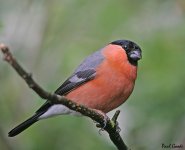catkin2909
New member
Hi all,
I am a new member to this forum; followed the link from a sightings page.
I do most of my wildlife watching around Moor Green Lakes in Berkshire.
My camera is an old Canon A1 35mm SLR but I have a telephoto lens and, with the x2 converter, I can get some decent shots but I would like to do more and I would like to go digital. I have looked at the tech specs for the Canon EOS, Nikon and Olympus but can't decide. Before I spend shed loads of money can someone please tell me what they use in the field and how they find it.
Thanks
Christine :stuck:
I am a new member to this forum; followed the link from a sightings page.
I do most of my wildlife watching around Moor Green Lakes in Berkshire.
My camera is an old Canon A1 35mm SLR but I have a telephoto lens and, with the x2 converter, I can get some decent shots but I would like to do more and I would like to go digital. I have looked at the tech specs for the Canon EOS, Nikon and Olympus but can't decide. Before I spend shed loads of money can someone please tell me what they use in the field and how they find it.
Thanks
Christine :stuck:





